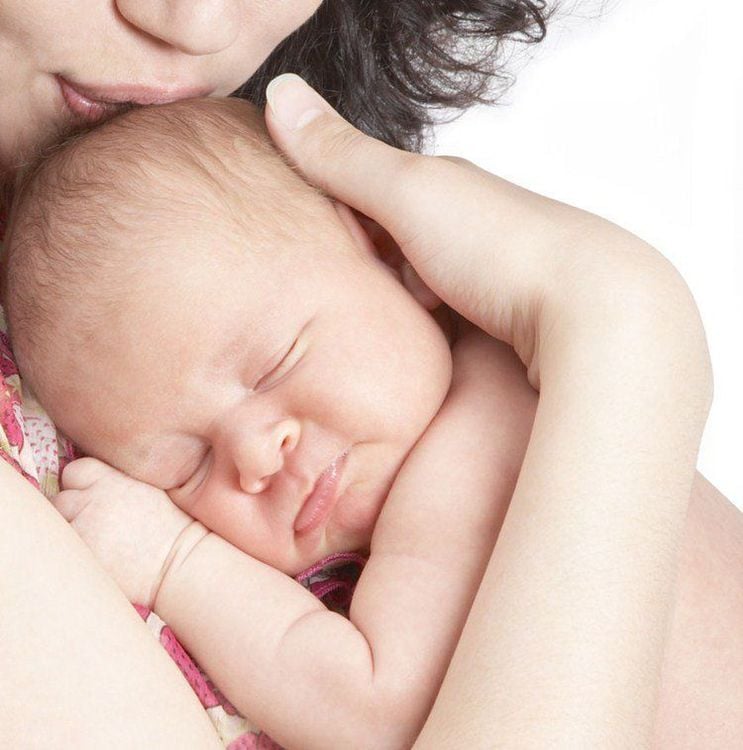This is an automatically translated article.
The article was consulted with Specialist II Chung Thi Mong Thuy - Pediatrician - Neonatologist - Department of Pediatrics - Neonatal, Vinmec Central Park International General Hospital.The first period after birth is a time when parents are prone to stress because this is the period when the baby needs to gradually adapt to the unfamiliar life outside the womb. During this period, babies cry a lot, especially in the late afternoon and early evening.
Many parents face a situation where their baby is crying and doesn't know how to handle it. To help mothers and babies reduce stress in the postpartum period, parents need to find out the reasons why the baby is crying and have methods to support the child.
1. Understanding infant sleep
Infants aged 0 to 1 month have longer sleep cycles than wakefulness. Children often wake up only when hungry to feed, on average, about 2-3 hours, children wake up to feed once. The average sleep time of children is about 18-20 hours in the neonatal period, gradually decreasing after that. Until the child is 1 year old, the average sleep time is 12-14 hours. Children often sleep more during the day and stay up at night. Parents should respect the physiological sleep of the child, should not wake the child when the child is not hungry yet to ask for a feed. Some special cases such as premature babies, low birth weight babies, children with gastroesophageal reflux need to divide the feeding time, feeding time ...Understanding the physiology of sleep in the neonatal period is important. Help parents make appropriate changes in the process of taking care of children, helping children to reduce crying.

Trẻ sinh non cần được bú nhiều lần hơn
2. How to keep the baby from crying when put down on the bed?
Because the baby is hungry, due to wet diapers, the child wants to be cuddled and cuddled, the child is full of stomach, indigestion, apples, slow bowel movements, the child is cold or hot, or is bitten by insects or by noise or light that is uncomfortable for the baby. young. Sometimes children are not well...also fussy.Newborns often need cuddles, caresses, and feelings of protection. Babies love to feel their parents' presence through their parents' familiar faces and voices. Many children even recognize the unique scent of each person. Crying can be a baby's way of asking to be loved and cuddled. Some parents will wonder if they will damage their baby by carrying too much, but rest assured, in the first months of life, the baby will not be damaged in this way.

Nên ru và ôm ấp cho đến khi bé đi vào giấc ngủ để tránh khiến trẻ giật mình khi đặt xuống
Of course, this does not mean that the baby will not be able to fall asleep on his own in the crib or that parents cannot train the baby to sleep alone. Occasionally, babies may wake up when they are hungry and look at the attention-grabbing objects around them. Parents should prepare and prepare the bed for the child to create a sense of security and comfort such as occasionally turning the child's sleeping position or changing the surrounding objects. In a few weeks, babies will begin to explore and play with their hands; seeing, feeling, touching, sucking and controlling objects as if playing a game. This makes the baby always feel interesting and not fussy if he has to wake up alone in the middle of the night.
At the age of a few months, babies can play alone for a short period of time, so parents will not encounter many situations where babies put down and cry. Even at this time, parents can train their babies to fall asleep on their own without too much support. What needs to be done is taking care of or cuddling the baby to create a sense of peace of mind with the parents by his side to help the baby get ready to go to sleep when it is put down. Another way is to lay your baby down first and then rock the bassinet or stroke it to make them more comfortable.
3. Methods to help children sleep well on their own
In order to limit the baby's fussing when lying down, some measures to help the baby sleep well can also be applied such as:Recognizing when the baby is sleepy: recognizing when the child is sleepy to lull them to sleep. It is essential for a good night's sleep. Most babies when they feel sleepy will show signs such as blinking, yawning, pulling their ears, and fidgeting. It is often easy for a mother to detect and feel her baby is sleepy and should be placed in a bed or crib. Help children get used to the day-night cycle: help children distinguish between day and night through measures such as: Talking and playing with children more during the day. Children's rooms should be airy and well-lit during the day. When breastfeeding during the day, it is not necessary to limit the noise. When the baby is not asleep yet, the mother can gently wake the baby. On the contrary, at night, it is advisable to keep quiet while the baby is nursing. Children's bedroom at night should turn off all lights or choose a soft light mode

Ba mẹ cần nhận biết dấu hiệu buồn ngủ của trẻ để cho trẻ ngủ đúng giấc
Practice for babies to sleep on their own: when entering the second month of age, parents can start to teach their babies the habit of sleeping on their own. Children should have their own crib or bed to put them down when they are sleepy but still awake. The essence of training the baby to go to sleep on his own is to form a conditioned reflex. If parents choose to rock the crib or hold and rock the baby, the baby will not be able to sleep without being rocked like that. Parents should choose "conditions" that are easy to do so that they can be repeated every time the baby sleeps. Many experts believe that the baby should be placed in the crib or bed when the baby is sleepy, so that the light is soft and soothing music can be played for the baby. It is not advisable to suck on a pacifier or lull your baby to sleep in your arms. Crying when put down is a common occurrence in babies during the first few weeks. Parents can apply some of the methods in the above article to help children have a good night's sleep, not fuss and help children develop comprehensively.
For children to be healthy and develop well, it is necessary to have a nutritious diet in terms of quantity and quality balance. If children are not provided with adequate and balanced nutrients, it will lead to diseases of excess or lack of nutrients, which adversely affect the comprehensive development of children in terms of physical, mental and motor skills. Parents should supplement their children with supporting products containing lysine, essential micro-minerals and vitamins such as zinc, chromium, selenium, and B vitamins to help fully meet the nutritional needs of children. At the same time, these essential vitamins also support digestion, enhance nutrient absorption, help improve anorexia, and help children eat well.
Parents can learn more:
Signs of zinc deficiency in children
Micronutrient deficiency and failure to gain weight in children
Please regularly visit Vinmec.com website and update useful information to take care of your child. Take care of the baby and the whole family.
Reference source: babycenter.com














